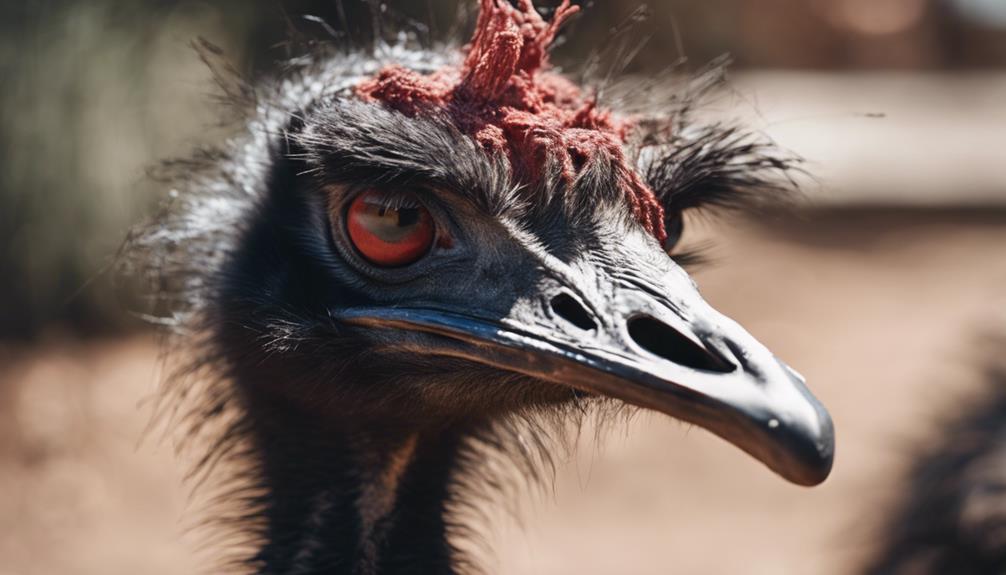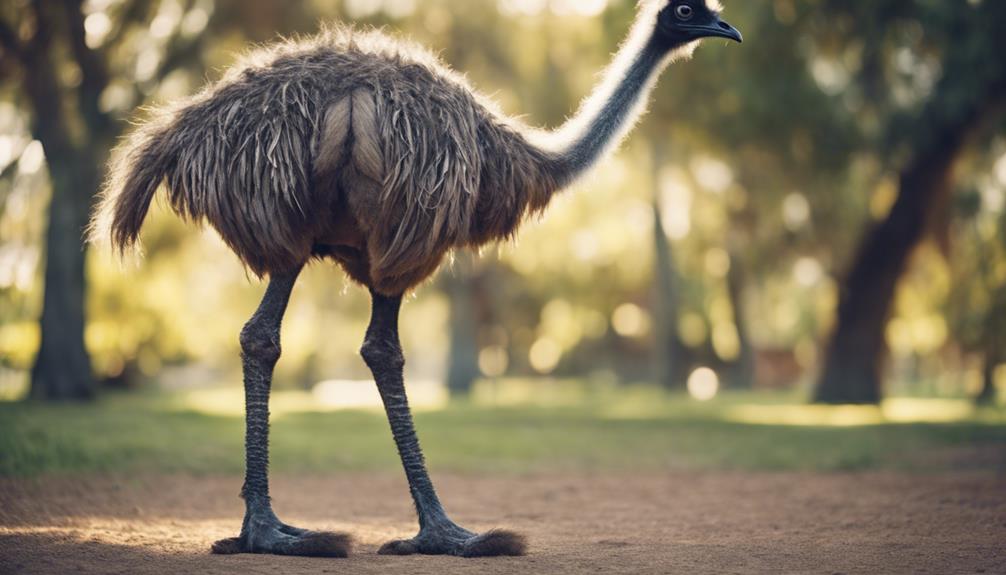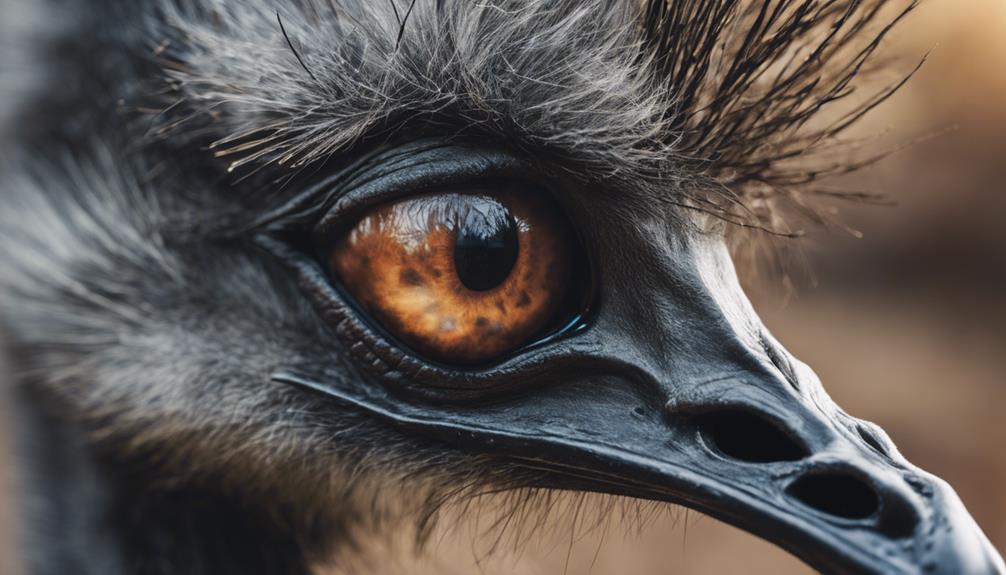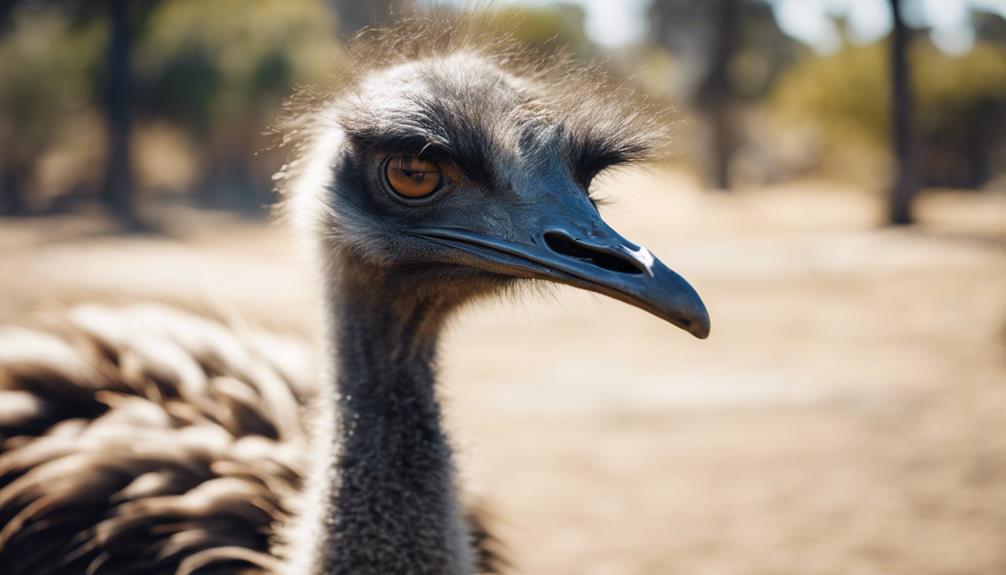
Just like a gardener tending to a variety of plants, addressing common health issues in emus requires a keen eye and a proactive approach.
From respiratory concerns to nutritional deficiencies, these majestic birds face a range of challenges that demand careful attention.
By understanding the root causes and implementing targeted interventions, you can ensure the well-being and longevity of your emu companions.
Whether it's tackling skin problems or managing stress levels, each aspect of their health is interconnected, and a holistic approach is key to fostering their optimal health.
Key Takeaways
- Ensure proper ventilation and cleanliness to prevent respiratory issues in emus.
- Regularly inspect emus for parasites and establish a control program with a vet.
- Provide a balanced diet rich in nutrients to support digestive and immune health.
- Implement stress reduction strategies and proactive safety measures to prevent injuries in emus.
Emu Respiratory Issues

Have you ever wondered how emus are affected by respiratory issues? Emus, like all living creatures, can face respiratory challenges that require attention. When it comes to emu respiratory treatments, it's crucial to work closely with a veterinarian who's experience with these unique birds. Treatments may include antibiotics, anti-inflammatories, and supportive care to help the emu recover from infections or illnesses.
Preventing emu infections is key to maintaining their respiratory health. Ensuring proper ventilation in their living area, keeping their environment clean, and minimizing stress can all contribute to reducing the risk of respiratory issues. Emus are susceptible to respiratory infections when exposed to damp or dirty conditions, so it's essential to keep their living space dry and hygienic.
Nutritional Deficiencies in Emus
Emus' overall health can also be impacted by nutritional deficiencies, which play a significant role in their well-being and vitality. To ensure your emus stay healthy, it's crucial to understand their dietary requirements and provide necessary nutritional supplements. Here are some key points to consider:
- Emu Dietary Requirements: Emus require a balanced diet that includes a variety of foods such as fruits, vegetables, grains, and proteins. It's essential to provide them with a diet rich in nutrients like vitamin E, calcium, and omega-3 fatty acids to prevent deficiencies.
- Nutritional Supplements: In some cases, emus may need additional nutritional supplements to meet their dietary needs adequately. Consult with a veterinarian or an avian nutritionist to determine if your emus require supplements and the appropriate dosage.
- Monitoring and Adjusting: Regularly monitor your emus' health and behavior to detect any signs of nutritional deficiencies. Adjust their diet or supplement regimen as needed to ensure they receive optimal nutrition for their well-being.
Skin Problems in Emus

Skin issues commonly affect the health and well-being of emus, requiring careful attention and management to ensure their overall vitality. Feather abnormalities, such as feather loss or discolored feathers, can indicate underlying skin problems in emus. These issues may arise due to various factors including poor diet, environmental stress, or skin infections.
To address feather abnormalities, it's crucial to consult with a veterinarian for proper diagnosis and treatment. Emu skin care plays a significant role in preventing and managing skin problems. Providing emus with dust baths can help maintain healthy skin by removing excess oils and debris. Additionally, ensuring proper hydration and a balanced diet rich in essential nutrients can promote healthy skin and feather growth.
Regularly inspecting your emus for any signs of skin irritation or lesions is essential for early detection and prompt treatment. By implementing these emu skin care tips, you can help your emus maintain optimal skin health and overall well-being.
Emu Parasite Infestations
Emus are susceptible to various parasite infestations that can significantly impact their health and well-being if left untreated. Understanding emu parasites and controlling infestations are crucial aspects of their care.
Parasite Prevention: Regularly inspect your emus for signs of parasites such as lice, mites, or ticks. Keep their living areas clean and dry to reduce the risk of infestations. Consult with a veterinarian to establish a preventative parasite control program tailored to your emus' specific needs.
Emu Treatment Options: If you suspect your emus have a parasite infestation, seek veterinary guidance promptly. Treatment options may include topical solutions, oral medications, or environmental treatments to eradicate parasites effectively. Follow your veterinarian's instructions carefully to ensure the treatment's success and prevent reinfestation.
Monitoring and Control: Monitor your emus regularly for any signs of recurring parasite infestations. Implement strict biosecurity measures to control parasites and prevent their spread among your emu flock. Regularly review and update your parasite prevention and control strategies to safeguard your emus' health.
Digestive Disorders in Emus

Inspecting the overall health of your emus goes beyond addressing parasite infestations; now let's focus on understanding digestive disorders in these fascinating birds. Emus have specific dietary requirements that must be met to maintain their digestive health. These flightless birds primarily consume a diet of plants, insects, and small rocks to aid in digestion. Ensuring they have access to a variety of vegetation and suitable grit is crucial for their digestive system to function optimally.
When it comes to treating emu indigestion, it's essential to first identify the root cause. Common causes of digestive issues in emus include consuming toxic plants, overeating, or sudden changes in diet. If you notice your emus showing signs of indigestion such as decreased appetite, diarrhea, or lethargy, it's vital to consult with a veterinarian experienced in treating exotic birds. Treatment may involve dietary adjustments, providing access to clean water, and in severe cases, medication to alleviate digestive discomfort. Remember, a well-balanced diet is the cornerstone of digestive health in emus.
Emu Reproductive Health Concerns
To ensure the reproductive health of your emus, it's crucial to monitor their breeding behaviors and nesting habits closely. Emu breeding challenges can arise due to various factors, impacting their overall reproductive health. Here are some key points to consider:
- Emu breeding challenges: Emus may face difficulties in mating, leading to reduced breeding success rates. Understanding their natural breeding behaviors and providing a suitable environment can help mitigate these challenges.
- Reproductive health issues: Keep a close eye on your emus for any signs of reproductive health issues such as egg binding or hormonal imbalances. Prompt veterinary care is essential to address these concerns effectively.
- Emu fertility concerns: Factors like age, diet, and stress levels can affect emu fertility. Consulting with a veterinarian specializing in exotic birds can help you optimize your emus' fertility and breeding potential.
Being proactive in monitoring and addressing any reproductive system disorders or fertility issues can significantly contribute to the overall well-being and successful breeding of your emus.
Musculoskeletal Conditions in Emus

Monitoring the musculoskeletal health of your emus is crucial to ensure their overall well-being and longevity, as these birds are susceptible to various conditions affecting their bones, muscles, and joints. Emu joint health is vital for their mobility and quality of life. If you notice any signs of joint issues, consulting a veterinarian for rehabilitation options is recommended. Emus can also suffer from bone fractures, which may occur due to accidents or deficiencies in their diet. In case of emu bone fractures, swift treatment is essential. This could involve immobilization and supportive care to aid in the healing process. Here's a table summarizing key points on emu musculoskeletal conditions:
| Musculoskeletal Conditions in Emus | Details |
|---|---|
| Emu Joint Health | Essential for mobility |
| Rehabilitation | Consult a veterinarian |
| Emu Bone Fractures | Swift treatment required |
Emu Behavioral Health Issues
Ensuring the behavioral well-being of your emus is essential to maintaining their overall health and happiness. Emus are social creatures that thrive on interaction with their peers. Understanding Emu socialization dynamics can help you create a harmonious environment for your birds. Emus often form close-knit groups in the wild, so providing opportunities for socializing with other emus can prevent feelings of isolation and loneliness.
Emu anxiety triggers are important to recognize and address promptly. Changes in their environment, such as loud noises or sudden movements, can cause stress and anxiety in emus. It's crucial to create a calm and predictable setting to help alleviate their anxiety. Additionally, overcrowding or lack of space can lead to territorial behaviors and aggression among emus. Providing adequate space and enrichment activities can help reduce these issues.
- Understand Emu socialization dynamics
- Recognize Emu anxiety triggers
- Create a calm and enriching environment for your emus
Identifying Emu Eye Problems

Identifying potential eye problems in your emus is crucial for maintaining their overall health and well-being. Emu vision care is essential to ensure they navigate their surroundings and forage effectively. Keeping an eye on their eye health in emus involves regular observation and prompt action if any issues arise.
Ocular issues in emus can vary from minor irritations to more severe conditions that may impact their sight. Common signs of emu sight problems include excessive blinking, cloudiness in the eyes, redness, or discharge. If you notice any of these symptoms, it's advisable to consult a vet experienced in treating birds, particularly emus.
Regularly inspecting your emus' eyes during routine health checks can help in early detection of any potential problems. Providing a clean environment, free from irritants, and ensuring a balanced diet rich in essential nutrients can contribute to maintaining good eye health in emus. Remember, proactive monitoring and quick intervention are key to preserving your emus' eye health and overall well-being.
Emu Immune System Challenges
Emus face unique challenges when it comes to their immune system function, requiring specific care and attention to maintain their health. The regulation of the emu immune system is crucial for their overall well-being.
Here are some disease resistance strategies that can help support their immune health:
- Proper Nutrition: Ensuring emus have a balanced diet rich in vitamins and minerals is essential for supporting their immune system function.
- Regular Veterinary Check-ups: Routine check-ups with a qualified vet can help detect any potential health issues early on and prevent them from escalating.
- Hygiene Management: Maintaining clean living environments and regularly disinfecting food and water sources can reduce the risk of infections that may compromise the emus' immune system.
Managing Emu Stress Levels

To optimize the health and well-being of emus, it's imperative to effectively manage their stress levels in order to support their overall immune system function. Emus, like many other animals, can experience stress due to various factors such as changes in their environment, handling, or social interactions. Implementing stress management techniques and coping mechanisms is crucial in maintaining their overall health.
Emu relaxation methods can include providing them with a spacious and enriched environment that mimics their natural habitat, ensuring they've access to clean water and a balanced diet, and minimizing exposure to loud noises or aggressive behaviors. Additionally, creating a routine that includes regular feeding times and gentle interactions can help reduce stress levels in emus. Stress reduction strategies like offering opportunities for exercise and mental stimulation through foraging activities can also contribute to their well-being. By actively monitoring and addressing sources of stress, you can help your emus lead a happier and healthier life.
Preventing Common Emu Injuries
Prevent common injuries in emus by carefully assessing their environment for potential hazards and implementing proactive safety measures to mitigate risks. Emus are curious creatures that can sometimes get themselves into risky situations, so it's essential to create a safe space for them to thrive.
Here are some tips to help you prevent common emu injuries:
- Regularly inspect enclosures: Check for sharp objects, loose wires, or any other potential hazards that could cause harm to your emus.
- Provide adequate fencing: Ensure that the fencing around their habitat is secure and tall enough to prevent emus from escaping or injuring themselves.
- Offer proper emu handling training: Educate yourself and others who interact with emus on safe handling techniques to minimize the risk of accidents.
In case an injury does occur, knowing how to provide emu wound care and immediate first aid is crucial. Being prepared for emergencies can make a significant difference in the health and well-being of your emus.
Frequently Asked Questions
Can Emus Be Vaccinated to Prevent Respiratory Issues?
Yes, emus can be vaccinated to prevent respiratory issues. Emu vaccination has shown effectiveness in boosting their immunity against common respiratory illnesses. It is a proactive measure that can significantly contribute to their overall respiratory health.
How Can Emus Be Protected From External Parasites Like Mites and Ticks?
Imagine creating a shield of protection for your emus against pesky mites and ticks. Utilize natural remedies like essential oils or diatomaceous earth for prevention. Regularly inspect and clean their environment to keep these parasites at bay.
Are There Specific Supplements That Can Help Improve Emus' Immune System?
To boost your emus' immune system, consider dietary enhancements. Natural remedies like specific supplements can aid in disease prevention. These additions provide essential nutrients for overall health and vitality, supporting your emus' well-being.
What Are Some Common Signs of Stress in Emus and How Can It Be Managed?
To recognize stress in emus, observe excessive pacing, feather plucking, or aggression. Behavioral modifications like providing environmental enrichment and behavioral therapy can help manage stress. Create a calm environment to support their mental well-being.
Are There Any Specific Exercises or Treatments to Prevent Musculoskeletal Conditions in Emus?
To prevent musculoskeletal conditions in emus, focus on maintaining a nutritional balance and providing proper housing. These elements play a crucial role in the overall health and well-being of emus, helping them stay strong and agile.
Conclusion
In conclusion, addressing common health issues in emus is crucial for their well-being. By staying vigilant and proactive in identifying and treating respiratory issues, nutritional deficiencies, skin problems, parasite infestations, digestive disorders, eye problems, immune system challenges, stress levels, and injuries, you can ensure your emus lead a healthy and happy life.
Remember, prevention is key to keeping your feathered friends in top shape. So, don't let them become 'sitting ducks' for potential health problems – take action now!




